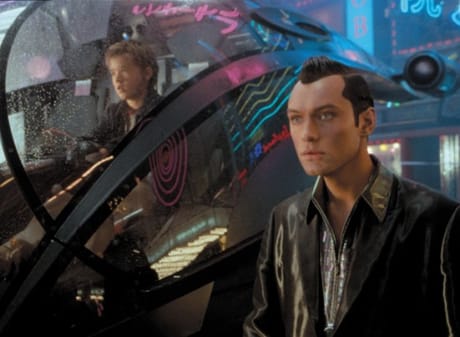On the feature-length "Making Of," which, on the A.I. Blu-Ray, is broken down into multiple mini-supplements on lighting, acting and so on, Spielberg discusses his collaboration with Stanley Kubrick on this project, noting that the major distinction in this final product from the original treatment is the shift in ideals from those of the now-deceased Kubrick's to Spielberg's. Observing the quaint prosaism and propulsive, uplifting simplification of potentially murky and unflattering subject matter, it doesn't take a genius to figure out just what said "ideals" might be, especially considering Kubrick's less than pat handling of humanity on film. From the get-go, there's an exceedingly didactic and patronizing, almost clinical approach to the subject of technological advancement and robot life forms as a mode of egocentric, God-complex posturing, with David's creator, Professor Hobby (William Hurt), making divine assertions while animatedly discussing the creation of David (Haley Joel Osment), a robot capable of love. Some wisecracks are made to relieve the tension for weaker audience members ― an obnoxious staple of the Spielberg lexicon ― but the exposition and pointed question, "But can we love a robot?" spell out the resulting journey to even the simplest viewer. Initially, the rapidly assembled series of familial vignettes with love-bot David and his new family ― grieving couple Monica and Henry Swinton (Frances O'Connor and Sam Robards) ― come off as cold and informational, with Monica struggling with feelings of ambivalence towards the off-centre creepiness and relentless neediness of her new emotional crutch, in the form of a wide-eyed boy. Some interesting questions arise in the periphery relating to human idealism, such as the creation of an ideal version of ourselves, exposing our emotional and moral limitations, given their rigidity in execution, not factoring in our inability to feel deserving of altruistic love or appreciate it in a sustained manner. It forces the observation that without consequence of action and potential loss should we vary from routine our appreciation of notice can turn to resentment and/or boredom. There's also the White Ribbon plight of creating a being with vacuum ideals in a social environment where notions of normalcy and social performance are fluid, giving rise to conflict and threat when the same programmed delusions of human goodness and stability aren't executed in real life. But Spielberg careens by these concepts without even a glimmer of investigation, sticking instead to a trajectory of glowing, heavenly lights and hopeful, creationist allegory, suggesting through David's single-minded quest to become a real boy, in order to fulfil his program needs, that hope is what defines man and robot alike. The whole alien thing in the third act is just reassuring, saccharine crap to give us the sense that we are indeed special, just as our mommies told us. This is just in case anyone was still stuck on the veiled narrative reality that we create fantasy versions of ourselves because we can never truly get what we desire from each other. On the product front, this Blu-Ray version of A.I. offers only what was already available on DVD, but with a surprisingly crappy High Definition transfer that suffers from the constant diaphanous use of smoke and bright white lights in the original print.
(Paramount Pictures)A.I.: Artificial Intelligence [Blu-Ray]
Steven Spielberg

BY Robert BellPublished Mar 29, 2011